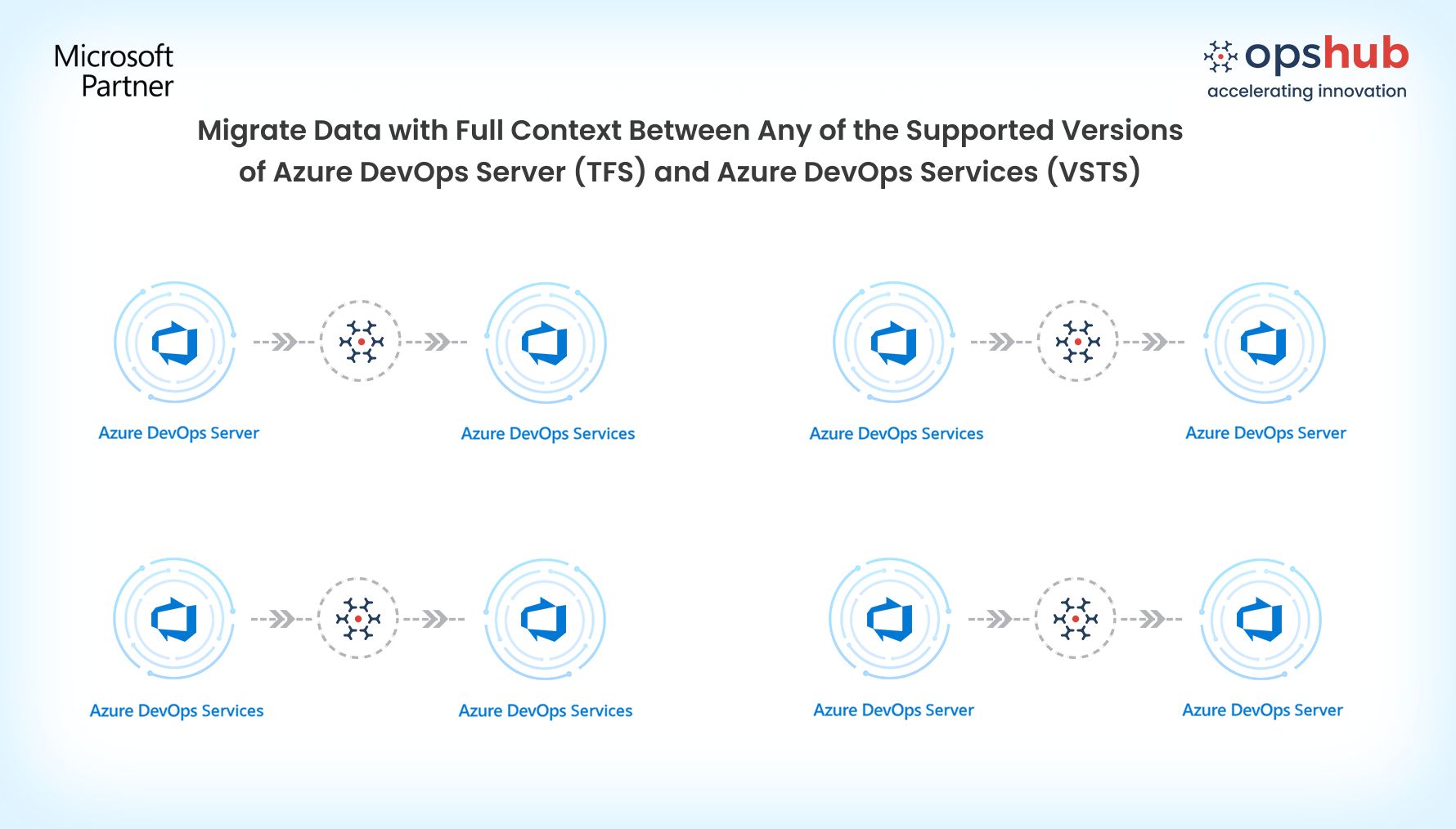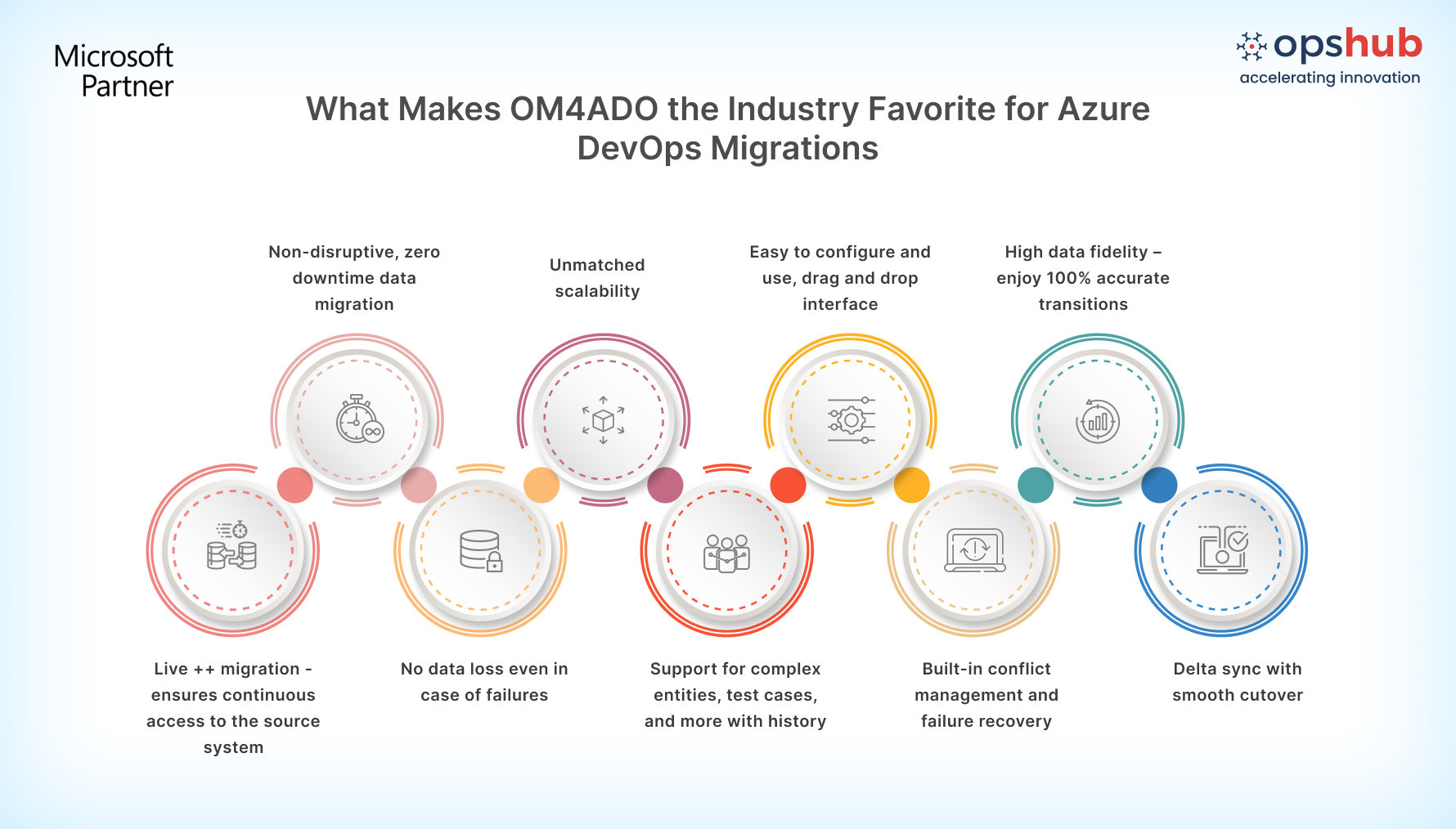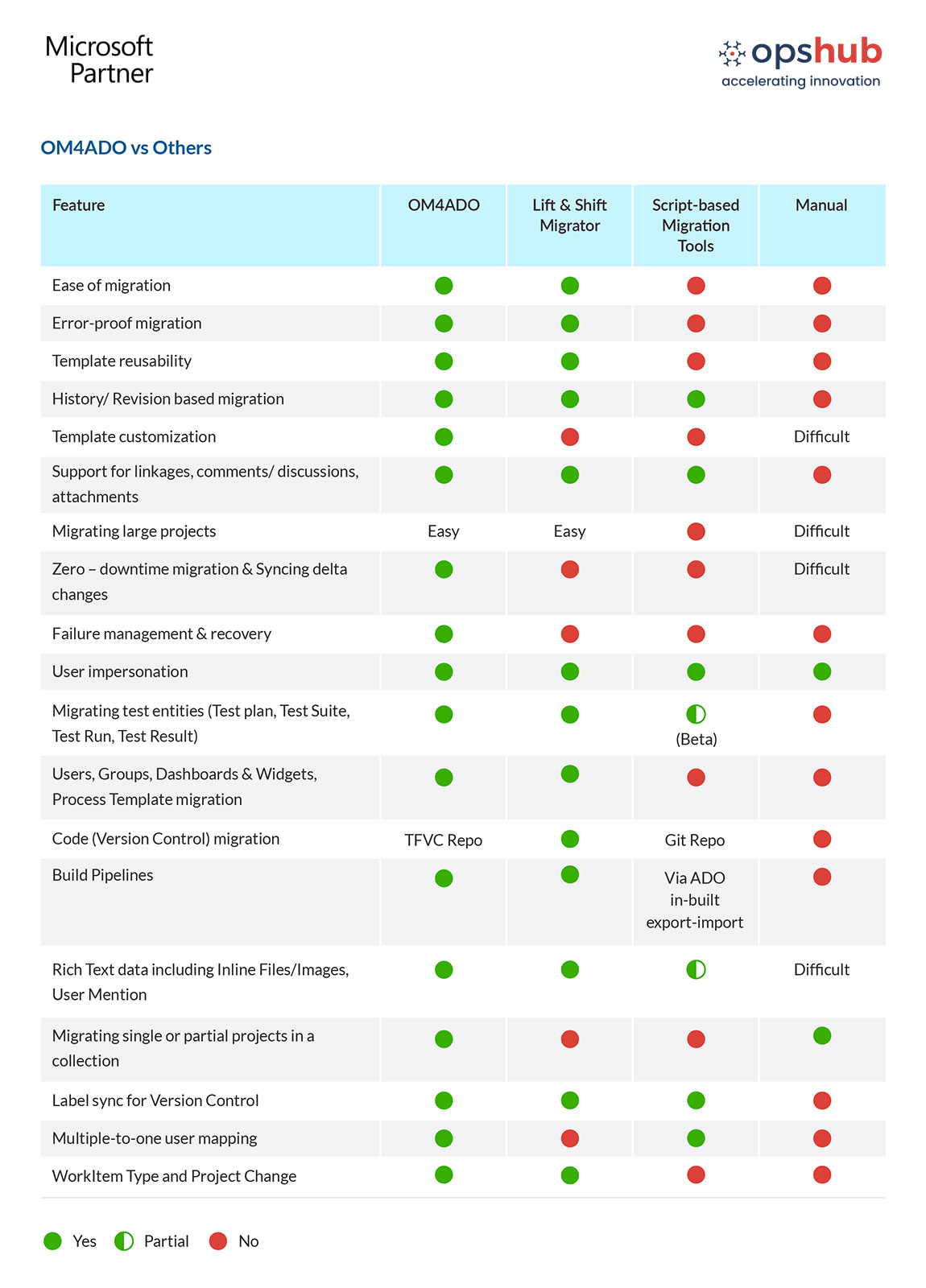NOTE: The original OM4ADO listing page with 30K+ downloads is temporarily unavailable due to a Microsoft glitch. We're actively working with Microsoft to restore the original OM4ADO listing page.
OpsHub Migrator for Microsoft Azure DevOps (OM4ADO)
OpsHub Migrator for Microsoft Azure DevOps (OM4ADO), co-built with Microsoft, is the industry recognized solution for non-disruptive and scalable Azure DevOps data migrations. Whether you’re migrating from Server (TFS) to Azure DevOps (Cloud or VSTS), consolidating multiple Azure DevOps Server (TFS)/Azure DevOps instances into one or moving from ADO Cloud back to Server (TFS), OM4ADO makes the process disruption-free. You can also migrate from one org to another org (Migrate from ADO Cloud to ADO Cloud) or move projects from ADO Cloud to ADO Cloud, while restructuring project hierarchies to align with evolving business goals-all while preserving data integrity, history, and relationships. OM4ADO enables modern enterprises to de-risk their migration challenges and helps in comprehensive transfer of data with full context – exclusively between any of the supported versions of Azure DevOps Server (TFS) and Azure DevOps (ADO/ Cloud).
Learn more about OM4ADO.
With OM4ADO, migrate to Azure DevOps environments already in use, supporting custom templates and field mappings without requiring an empty target. It supports older TFS/Azure DevOps Server versions (from 2010). Migrate directly from legacy TFS to Azure DevOps without intermediate upgrades, minimizing risk and disruption while unlocking the full potential of Azure DevOps Cloud.

Extensive Version & Entity Support
OM4ADO supports the migration of wide range of data types including:
- Supports migration of all Work Items, Test Entities (Test Case, Test Suite, Test Plan, Test Result, Test Run) Area Path, and Iteration, etc.
- Supports migration of TFVC and history
- Supports migration of Dashboard, Query, Widget, Pipelines (Build and Release), User permissions, Groups and Teams
- Supports all types of linkages, comments and attachments
- Supports migration of projects with custom work-item template
- Supports the 2010, 2012, 2013, 2015, 2018, 2019, and 2020, 2022 versions of Azure DevOps Server
- Supports all versions of Azure DevOps (Cloud)
Drop us line if you want to have a personalized demo.

Purpose- Built Data Migration Tool for TFS / Azure DevOps Migrations: OM4ADO
Works across older versions (support for TFS 2010 and above): No need for version upgrades just to migrate. Skip intermediate upgrades and migrate directly from legacy TFS to Azure DevOps with minimal risk.
Migrate to active Azure DevOps environments: Seamlessly migrate into ADO instances already in use, with full support for custom templates, process configurations, and field mappings—no empty target required
Configure in minutes, not months: Configure and manage migrations with a drag-and-drop GUI, suitable for both technical and non-technical users.
Modernization without downtime or disruption: Migrate while teams stay productive. OM4ADO keeps both systems in sync until final cutover, ensuring business continuity. No system interruptions either.
Migrate images, mentions, files and more: Transfer embedded images, TFVC, test results, test entities, test plans, test runs, pipelines (Build & Release), dashboards, queries, widgets, source code, history, comments, attachments and more while preserving links and relationships.
New templates & workflows: Transform, merge, split or restructure projects and workflows to fit modern DevOps models with OM4ADO’s intelligent transformation capabilities instead of a basic lift-and-shift.
Scale without slowing down systems: Gain a user friendly, drag & drop interface to monitor migration progress. Suitable for both technical & non-technical users.
Adopt new templates and workflows: Transform, merge, split or restructure projects and workflows to fit modern DevOps models with OM4ADO’s intelligent transformation capabilities instead of a basic lift-and-shift.
100% migration guarantee: OM4ADO provides a 100% guarantee that every work item and update reaches ADO as expected. It includes mechanisms to handle downtime, failures, and conflicts, ensuring reliable migration
Move at your own pace: Incremental migration allows teams to migrate in phases with continuous TFS access-no cold downtime.
Stay compliant and in control: OM4ADO’s reverse sync not only sends updates to ADO but also syncs changes back to TFS. This way, reports, audits, and compliance checks in the source stay alive and accurate until the migration is fully complete.
Protect data at every step: Enterprise-grade security safeguards all code and project data with encryption and role-based access controls.
Direct Azure DevOps migration without TFS upgrades: OM4ADO eliminates the need for intermediate servers, saving months of effort while ensuring data fidelity and a smooth transition to modern DevOps infrastructure.
Learn more about how OpsHub helped Canvas Credit Union, a leading financial cooperative with TFS (Server) to Azure DevOps(Cloud) migration
Common Use Cases Within Microsoft Landscape
OM4ADO has helped some of the biggest enterprises in the world with the following business use cases:
Migrate from TFS to ADO(Cloud): This is a classic migration scenario where organizations move from TFS (Server/ On premise) environment to Azure DevOps (Cloud) for better scalability and integration options.
Consolidation of Multiple Instances: Many organizations have multiple Azure DevOps instances due to acquisitions, mergers, or decentralized development teams. Merging these instances improves management and cost efficiency.
Reorganization of Project Hierarchy: Over time, project structures can become complex and inefficient. Reorganizing the project hierarchy is done to re-align with business units, teams, or product lines.
Selective Project Migration: Organizations need to migrate Azure DevOps project to another organization or migrate Azure DevOps to new tenant without disrupting the ongoing work. This can be due to restructuring, team reorganization, or compliance reasons.
Upgrade to Latest ADO Cloud Version: Keeping Azure DevOps (Cloud) up to date is essential for accessing new features and security patches. Upgrading to the latest version might involve data migration and configuration changes.
Learn more on how OpsHub helped infiNetix implement ADO migrations for its client.
What's More!
- Our solution works even when the domain users are linked to Azure DevOps Server (TFS) or live users are present in Azure DevOps (Cloud).
- Easily connects to on-premise Azure DevOps Server and migrates data effortlessly.
- Enable migration between two isolated servers.
- Migrate a project with a customized process template to an inherited process template-based project.
- Fully controlled setup and mappings.
- Migrate a single project from Azure DevOps Server to an existing organization
- Migrate data between different Azure DevOps (Cloud) instances.
- Consolidate all Azure DevOps Server (TFS) instances at one Azure DevOps (Cloud) instance or one place.
Connect with our Migration Engineer to discuss your use case.
Frequently Asked Questions (FAQs)
Q1) What options are available for migrating data to Azure DevOps?
Ans 1) There are multiple ways to migrate data into Azure DevOps, depending on the size and complexity of your migration. Some approaches work well for small or simple moves, but they often fall short for enterprise-scale scenarios.
Common migration approaches include:
Manual or basic utilities such as CSV export/import or Git clone/push, typically suited for limited data moves
Open-source migration tools that support basic work item migration with partial history
Script-based solutions using PowerShell or JSON pipelines for custom, one-off scenarios
Enterprise migration tools like OpsHub Migrator for Azure DevOps (OM4ADO)
For complex migrations that require full history, attachments, relationships, test assets, identity mapping, and minimal downtime, enterprise-grade tools are generally more reliable. OpsHub Migrator for Microsoft Azure DevOps (OM4ADO) is designed to handle these scenarios with full data fidelity and lower migration risk.
Q2) How can teams plan a smooth Azure DevOps migration?
Ans 2) A successful Azure DevOps migration usually follows a clear, step-by-step process to reduce risk and avoid surprises:
Review your existing TFS or Azure DevOps setup and identify what needs to be moved, such as work items, test artifacts, repositories, dashboards, and widgets.
Define the migration scope early to determine which projects, data, and history are required.
Choose a migration tool that meets your data fidelity and traceability needs.
Run a pilot migration to validate mappings, relationships, and data accuracy.
Perform the full migration with minimal disruption to ongoing work.
Complete post-migration validation to confirm that history, attachments, links, and user identities are intact.
Enterprise -grade migration tools like OpsHub Migrator for Microsoft Azure DevOps (OM4ADO) support this approach with features such as delta synchronization, resumable migrations, and automated identity mapping, helping teams transition smoothly to Azure DevOps.
Q3) How do I perform a TFS to Azure DevOps migration using OpsHub Migrator for Azure DevOps (OM4ADO)?
Ans 3) You can migrate from Azure DevOps to Azure DevOps (TFS to Azure DevOps) Services using OM4ADO in five simple steps:

Here are the steps in detail:
Step 1: Create a new migration configuration
Start by clicking New Migration in OM4ADO. Select Azure DevOps Server (TFS) as the source endpoint and Azure DevOps Services as the target endpoint.
OM4ADO supports migrations between:
Azure DevOps Server → Azure DevOps Services
Azure DevOps Server → Azure DevOps Server
Azure DevOps Services → Azure DevOps Services
You can migrate directly from TFS / Azure DevOps Server versions 2010, 2012, 2013, 2015, 2017, 2018, 2019, 2020, and 2022 without upgrading the source instance.
Step 2: Select the data to migrate
After clicking Next, select the data you wish to migrate. Choose the data types you want to migrate. OM4ADO allows you to select from multiple options, including:
Work items
Version control (with labels)
Area paths and iteration paths
Queries, dashboards, widgets, etc.
Note: Details given under Extensive Version and Support section above. You can select the entities as per your migration requirement.
Step 3: Select projects and validate templates
Select one or more projects to migrate. Ensure that the project name and process template are the same on both source and target. If a mismatch exists, OM4ADO will display a warning. In such cases, create the target project with the same name and template before proceeding.
Step 4: Map users between source and target
Map users from Azure DevOps Server to Azure DevOps (VSTS) to preserve fields such as Assigned To, Created By, and Changed By.
OM4ADO automatically maps users where display names match
Bulk user mapping can be done using an Excel import/export for large user bases
Step 5: Validate, run, and monitor the migration
OM4ADO validates differences between source and target process templates and highlights mismatches for review. Click on Finish and tool will automatically create the configuration. Once the configuration is complete, click on Yes to begin the migration. While the migration is happening:
Teams can continue working in the source system during migration
Incremental changes are automatically synchronized to the target
Migration progress can be monitored via View Migrations
OM4ADO also supports flexible cutover, allowing additional delta syncs even after the main migration completes.
Watch this video for the stepwise migration using OM4ADO.

| |




